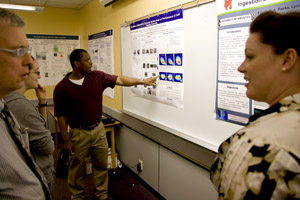High school science teacher Tammie LaBiche has spent much of her summer pouring over water samples from Lake Houston inside a laboratory at the University of Houston Cullen College of Engineering.
LaBiche has used the samples, taken from one of the city’s sources of drinking water, in a series of experiments designed to remove contaminants and organic compounds that can affect the purity and color of the water.
As a participant in the college’s Research Experience for Teachers (RET) program, she has been conducting these experiments alongside civil and environmental engineering professor Shankar Chellam for the last six weeks. Each brings them one step closer to understanding the role filtration can play in cleaning municipal water supplies.
RET is one of two summer programs of its kind offered at the Cullen College. Both RET and Research Experience for Undergraduates (REU) are intended to immerse area high school teachers and undergraduate students in the diverse work being done in laboratories across the college’s six departments.
“These programs are part of ongoing efforts by the college to interest more students in STEM fields,” said Fritz Claydon, associate dean for administration and research. “Teachers and students who participate not only receive the chance to collaborate with highly experienced, nationally recognized researchers, but also make important contributions to ongoing research efforts at UH.”
Over the course of the last six years, close to 80 teachers have participated in RET. Each year, it has exposed high school math and science teachers to the field and trained them to pass along their knowledge and enthusiasm to students to encourage the pursuit of technical careers. In addition, another nearly 120 undergraduate students have devoted their summers to REU.
For most in the two programs, summers spent in college laboratories have changed their way of thinking.
“This has been great,” said Allison Pekkanen, a junior biomedical engineering student at the University of Texas at Austin and 2010 REU participant. “It’s hard to get experience like this as an undergraduate. It really has me considering pursuing graduate school, and maybe having my own project one day.”
For LaBiche, who just came off her first year teaching 10th grade science at Galena Park High School, RET has not only provided her with the confidence to try more hands-on laboratory experiments, but it has helped her develop teaching modules, related to engineering, to take back to her classroom. Topping the list—the water filtration experiment, only she’s added a few twists.
“I’m going to have the students bring in water samples from bayous and ditches around their homes to test,” LaBiche beamed, noting she hopes that the lab and a field trip planned later to visit and test water with Chellam will allow her students to see exactly how engineers better people’s lives. “Since I teach at a title one school, most students don’t have a lot of engineering role models. This experience is not only helping me to open their eyes to the things that engineers do, but is also providing the opportunity to introduce them to an engineer. That’s priceless for these kids.”
RET and REU begin in June and May, respectively, and provide stipends to participants through grants from the National Science Foundation.
